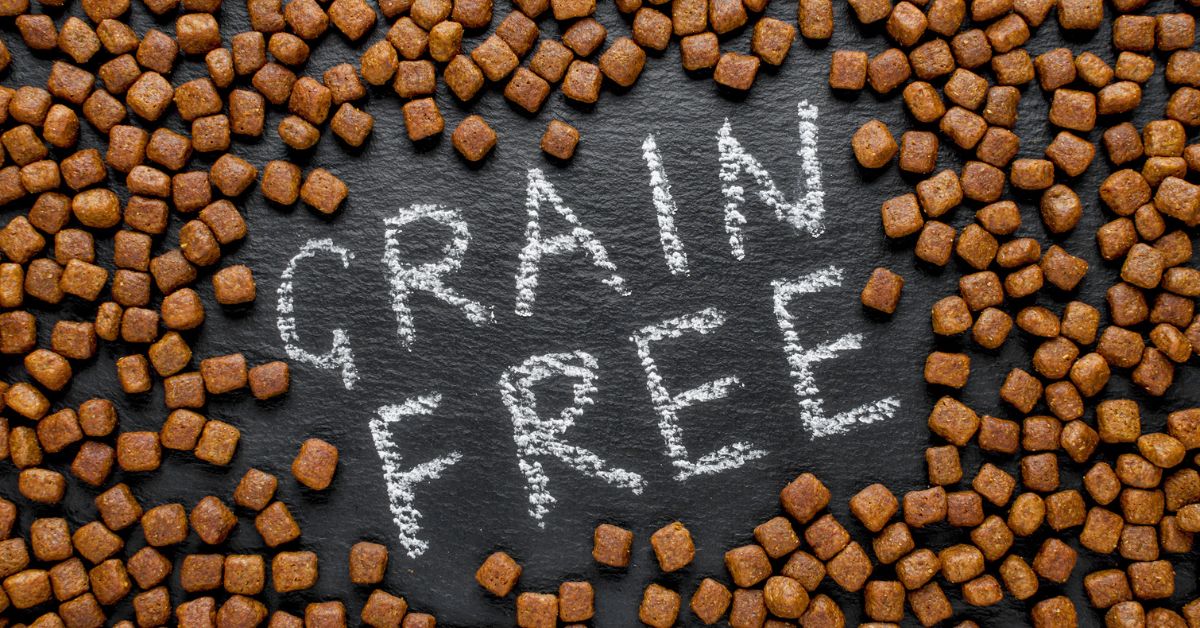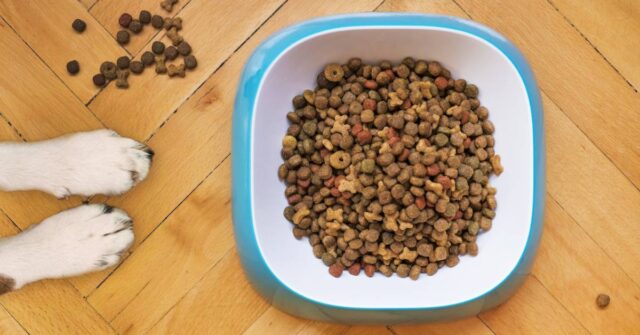Grain-free dog food has become a popular choice among pet owners, particularly those concerned about their dog’s diet and health. However, there is a lot of debate and confusion surrounding this topic.
This blog post aims to shed light on the truths and misconceptions about grain-free dog food, helping Australian dog owners make informed decisions.
Introduction to Grain-Free Dog Food
Grain-free dog food has surged in popularity over recent years, driven by a growing interest in pet nutrition and health.
Many pet owners seek out these products believing they offer health benefits or cater to specific dietary needs of their dogs.
However, there is still much debate and discussion about whether grain-free diets are the optimal choice for all dogs.
In this section, we’ll explore the fundamentals of grain-free dog food and its rise in popularity, particularly in Australia.
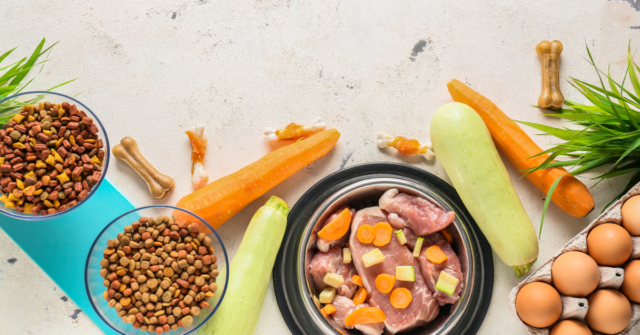
What Is Grain-Free Dog Food?
Grain-free dog food is exactly what it sounds like – dog food that is made without grains such as wheat, corn, rice, barley, and oats.
Instead of grains, these foods often use alternative sources of carbohydrates like potatoes, peas, lentils, and chickpeas.
The idea behind grain-free diets is to offer a more natural diet that mirrors what dogs’ wild ancestors might have eaten.
Popularity and Trends in Australia
In Australia, as in many parts of the world, grain-free dog food has seen a significant rise in popularity.
Many pet owners choose grain-free options believing they are healthier or because their dogs have shown sensitivities or allergies to grains.
Pet food aisles are now stocked with various grain-free options, catering to this growing demand.
However, it’s crucial to examine whether these diets are truly beneficial or if they are merely a marketing trend.
The Debate Around Grain-Free Dog Food
As grain-free diets gain traction among pet owners worldwide, it’s important to dive deep into the arguments for and against them, exploring both the scientific basis and anecdotal evidence that inform current perceptions.
Benefits of Grain-Free Diets for Dogs
Supporters of grain-free diets argue that such foods are more akin to a dog’s natural diet and can help with allergies, improve digestion, and promote better skin and coat health.
Some dogs with specific grain allergies or sensitivities may benefit significantly from these diets.
Additionally, grain-free foods are often higher in protein and lower in carbohydrates, which can be beneficial for maintaining a healthy weight.
Potential Risks and Controversies
Despite the touted benefits, grain-free diets are not without controversy.
The most significant concern is the potential link between grain-free diets and dilated cardiomyopathy (DCM), a serious heart condition in dogs.
Some studies have suggested that diets high in legumes, common in grain-free foods, might be associated with DCM.
The exact cause is still under investigation, but the findings have prompted caution among veterinarians and pet nutritionists.
Current Research on Grain-Free Diets and Canine Health
Ongoing research is examining the nutritional adequacy of grain-free diets and their long-term effects on canine health.
Studies are particularly focused on the role of taurine, an amino acid essential for heart health, which may be deficient in some grain-free diets.
Researchers are also exploring how the digestibility of alternative carbohydrates and proteins in grain-free foods impacts overall canine health.
Understanding Canine Nutrition
Proper nutrition is foundational to a dog’s health and longevity. This section will unpack the roles of various nutrients and how grain-free diets alter these dynamics.
Essential Nutrients for Dogs
Dogs require a balanced diet that includes proteins, fats, carbohydrates, vitamins, and minerals.
Proteins provide essential amino acids, fats are a source of energy and essential fatty acids, while carbohydrates supply energy and fibre.
Vitamins and minerals are vital for various metabolic processes and overall health. Ensuring that these nutrients are present in the correct proportions is critical for a dog’s well-being.
Role of Grains in Canine Diets
Grains are a source of carbohydrates, fibre, and essential nutrients such as vitamins and minerals. They can be easily digestible and provide energy for dogs.
Contrary to popular belief, most dogs can digest grains quite well, and only a small percentage of dogs have true grain allergies.
Grains also contribute to the overall nutrient profile of dog food, making them a valuable component of a balanced diet.
Alternatives to Grains in Dog Food
In grain-free dog foods, grains are often replaced with ingredients like potatoes, sweet potatoes, peas, lentils, and chickpeas.
These alternatives provide the necessary carbohydrates and fibre but can differ in their nutritional profiles.
It’s important to understand how these substitutes affect the overall balance of nutrients and whether they meet the dietary needs of dogs as effectively as grains.

Health Implications of Grain-Free Diets
Recent concerns about the health implications of grain-free diets, particularly regarding heart health, have stirred debate among experts. Here we will look closely at what research says about these concerns.
Dilated Cardiomyopathy (DCM) and Grain-Free Diets
The potential link between grain-free diets and DCM has raised concerns among dog owners and veterinarians.
DCM is a condition where the heart becomes enlarged and weakened, leading to heart failure. Some grain-free diets, particularly those high in legumes, have been associated with cases of DCM.
While the exact cause is not fully understood, it’s believed that certain ingredients might affect taurine absorption or metabolism, contributing to heart issues.
Taurine Deficiency in Dogs on Grain-Free Diets
Taurine is an amino acid crucial for heart function. Some dogs on grain-free diets have been found to have low taurine levels, which can contribute to the development of DCM.
Ensuring adequate taurine intake is essential, especially for breeds that are predisposed to taurine deficiency.
Pet owners should consult with their veterinarians to ensure their dog’s diet meets all nutritional requirements, including taurine.
Veterinary Insights on Grain-Free Feeding
Veterinarians generally recommend a balanced diet that meets the nutritional needs of dogs.
For dogs with specific allergies or sensitivities, grain-free diets can be beneficial, but they should be selected carefully.
Consulting with a veterinarian before making significant changes to a dog’s diet is crucial to ensure it supports the dog’s health and well-being.
Regular check-ups can help monitor any potential issues that may arise from dietary changes.
Choosing the Right Dog Food
With numerous options on the market, selecting the right dog food is a significant decision for pet owners.
This section provides guidance on what to consider, especially when looking at grain-free options.
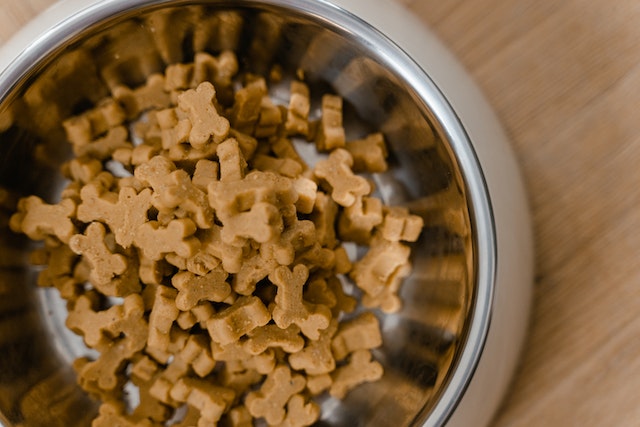
How to Evaluate Dog Food Labels
Evaluating dog food labels can be challenging, but understanding the ingredients and nutritional information is crucial.
Look for foods that list high-quality protein sources as the main ingredient. Avoid foods with excessive fillers or artificial additives.
Ensure the food meets the standards set by the Association of American Feed Control Officials (AAFCO), which indicates it is nutritionally complete and balanced.
Grain-Free vs. Grain-Inclusive: Making an Informed Decision
The choice between grain-free and grain-inclusive diets should be based on individual dog needs. While some dogs thrive on grain-free diets, others do well on grain-inclusive foods.
Consider factors such as your dog’s age, breed, health status, and any known allergies or sensitivities.
Consulting with a veterinarian can provide valuable guidance in making the best choice for your dog’s diet.
Consulting with Veterinarians on Dog Diet Choices
Veterinarians can provide expert advice on selecting the best diet for your dog. They can help identify any dietary issues and recommend appropriate foods or supplements.
Regular veterinary visits are essential for monitoring your dog’s health and ensuring their diet supports their overall well-being.
Don’t hesitate to seek professional advice when choosing or changing your dog’s diet.
Common Myths and Misconceptions
Misinformation can lead to confusion. Here, we debunk prevalent myths and clarify what’s scientifically valid to help you make better-informed decisions regarding grain-free dog food.
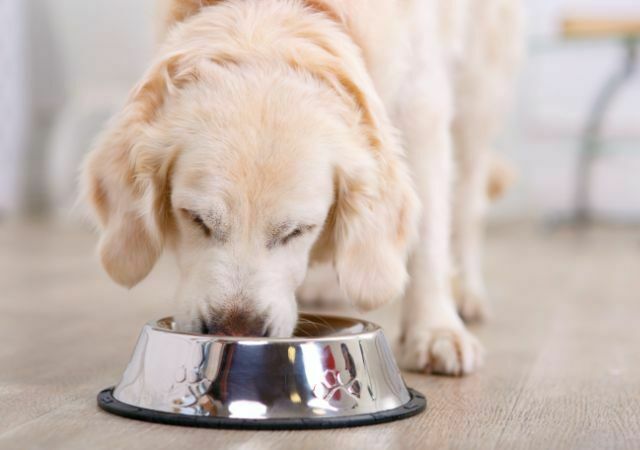
Debunking Myths About Grain-Free Dog Food
One common myth is that all grains are bad for dogs. In reality, most dogs can digest grains and benefit from the nutrients they provide.
Another misconception is that grain-free diets are always better. While they can be beneficial for dogs with specific dietary needs, they are not inherently superior.
It’s essential to focus on the quality and nutritional balance of the dog food rather than whether it contains grains.
Understanding Dog Food Marketing Claims
Dog food marketing can be misleading, with terms like “natural,” “holistic,” and “premium” often used without clear definitions.
It’s important to look beyond marketing claims and examine the actual ingredients and nutritional content of the food.
Understanding what your dog needs and how to read labels can help you make informed decisions, avoiding falling prey to marketing hype.
Case Studies and Real-World Examples
To better understand the impact of grain-free diets, we’ll examine both success stories and challenges faced by dogs on these diets, drawing on real-world cases and expert analyses.
Success Stories: Dogs Thriving on Grain-Free Diets
Many dog owners have reported positive outcomes with grain-free diets, particularly for dogs with allergies or digestive issues.
These success stories highlight the benefits of choosing the right diet for individual dogs.
Sharing real-world examples can provide insight into how grain-free diets have helped improve the health and quality of life for some pets.
Challenges Faced by Dogs on Grain-Free Diets
On the flip side, some dogs have experienced issues with grain-free diets, including nutritional deficiencies and health problems like DCM.
It’s essential to recognize that what works for one dog may not work for another.
Understanding the potential challenges and closely monitoring your dog’s health can help address any issues that arise from dietary choices.
Regulatory and Industry Perspectives
This section discusses how the dog food industry is regulated, the standards in place, and future trends that could influence how we feed our pets.

Standards and Regulations in Dog Food Production
Dog food production is regulated to ensure safety and nutritional adequacy.
In Australia, pet food standards are overseen by the Pet Food Industry Association of Australia (PFIAA) and align with international guidelines.
Understanding these regulations can help pet owners make informed choices and select foods that meet high standards of quality and safety.
Future Trends in Dog Nutrition and Industry Responses
The pet food industry is continually evolving, with new trends and research shaping the market.
Future trends may include more focus on personalized nutrition, sustainable ingredients, and scientifically backed formulations.
Staying informed about these trends can help pet owners choose diets that reflect the latest advancements in canine nutrition.
Conclusion and Recommendations
In concluding, we will summarize the key takeaways from our discussion on grain-free dog food and provide practical recommendations for dog owners navigating this complex topic.
Summary of Key Points
Grain-free dog food has both its advocates and critics.
While it may offer benefits for some dogs, particularly those with specific allergies or sensitivities, it also carries potential risks, such as a possible link to dilated cardiomyopathy (DCM).
Understanding the nutritional needs of dogs, the role of grains, and the implications of a grain-free diet is essential for making informed choices.
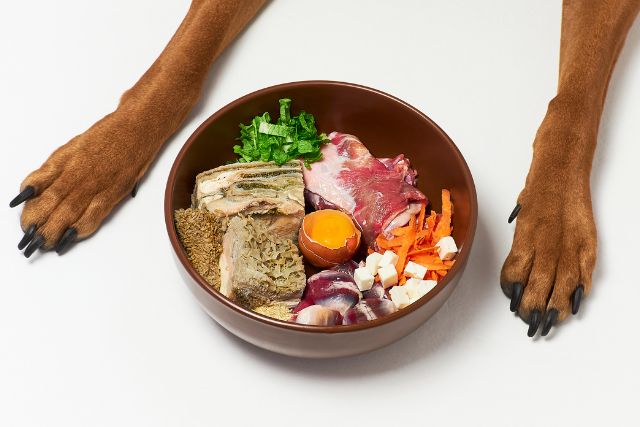
Consulting with veterinarians and carefully evaluating dog food labels can help ensure that your dog receives a balanced and healthy diet.
It’s important to remain sceptical of marketing claims and to prioritize the overall nutritional quality of the food over whether it is grain-free or grain-inclusive.
Final Thoughts and Best Practices for Dog Owners
As a dog owner, your priority is your pet’s health and happiness. When considering a grain-free diet, weigh the potential benefits and risks, and always seek advice from a veterinary professional.
Monitor your dog’s health regularly and be prepared to make dietary adjustments as needed.
Remember, there is no one-size-fits-all solution when it comes to dog nutrition. What works best for one dog might not be suitable for another.
Stay informed, keep an open dialogue with your veterinarian, and focus on providing a balanced, high-quality diet tailored to your dog’s individual needs.
By doing your research and making thoughtful choices, you can help your dog thrive and enjoy a long, healthy life.

